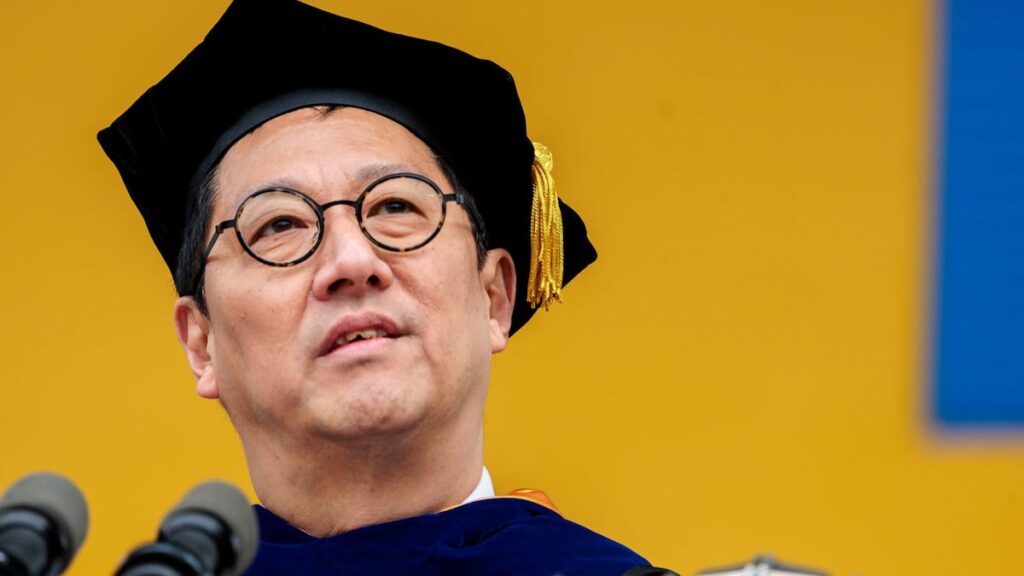The University of Florida has never been stronger. And our commitment to becoming the country’s top public university was by no means clear. As we enter the next chapter, bold leadership is essential to maintaining the extraordinary momentum that defines gatorianation. Therefore, the University of Florida Presidential Search Committee recommends unanimously make Dr. Santa J. Ono the 14th president as UF’s sole public finalist.
This transition comes at a time of rapid change in higher education. From artificial intelligence to the growing talent, to the evolving role of public institutions, leading the university today requires the ability to connect people around vision, courage and shared purpose.
At the beginning of this search process, I understood the importance of listening. We started by hosting 10 listening sessions with students, faculty, staff, alumni, donors, administrators and members of the Gainesville community. These conversations shaped our priorities and decision-making.
Our 15 member search committee (each signed this operation) reflects the breadth and depth of the UF community. The committee will include 10 alumni, seven key donors, four respected faculty leaders and student leaders. It also consists of Florida and national leaders in areas such as public services, agriculture, healthcare, legal, insurance, transportation, real estate, and land development. This broad perspective informs every step of the process and reflects the statewide and national impact of the University of Florida.
Our committee worked diligently for almost five months. We carried out a comprehensive and thoughtful process. Though thorough, the search was efficient and focused. This was driven by the urgency of continuing the prominent trajectory of UF without delay. Throughout, we continued to be guided by the feedback we received from the university community.
One of the most consequential decisions we faced was how we designed the search process itself. Regulations in the Florida university system typically require the Presidential Search Commission to recommend two or more finalists. For many universities across the state, that model makes sense. However, the regulations allow for flexibility in exceptional circumstances where selecting multiple finalists is not feasible. This was one such case.
The search attracted a wide and impressive pool of candidates, particularly from the entire higher education landscape, including multiple sitting presidents of major research universities. That alone is a strong reflection of the rise in UF’s national height and the appeal of this opportunity. But all of the presidents in those seats made it clear. They will only participate if the process guarantees confidentiality and their names are not published unless they are the sole finalists.
Spend your days with Hayes
Subscribe to our free Stephenly newsletter
Columnist Stephanie Hayes shares thoughts, feelings and interesting business with you every Monday.
You’re all signed up!
Want more free weekly newsletters in your inbox? Let’s get started.
Check out all options
This is not merely rational. This is a standard practice at top research universities. The sitting president faces serious consequences at the current agency if he is publicly identified as a candidate who has failed in another search. That risk can be seen that many of the most experienced and qualified leaders enter an open, multi-finalist process.
In contrast, leaders who work as provosts and deans are usually highly qualified, but are usually seen as pursuing a natural next step in their career, and their candidates are often publicly supported by their own institutions. That distinction is why many major universities build searches accordingly.
The facts carry this. Over the past three years, 32 presidential searches have been carried out by member agencies of the American Association (AAU). It is widely considered to be the most prestigious organization of North America’s most prestigious research institutions, where UF is a member. Of these 32 searches, 30 resulted in only public finalists or internal appointments. Of the two who named multiple public finalists, we included the president, with only one sitting there. The individual was not a graduate of a major research university.
Of the last 32 searches conducted by research universities other than AAU, 20 have become the only public finalists. Of the 12 people who named multiple finalists, only three were included, including the current president of a major research university, but none included multiple hard-working presidents of a major research university.
In total, no one has publicly appointed a president of a major research university as a finalist over the past three years across 64 searches by major research universities.
This context informed us of our decision. During our process, it became clear that when the University of Florida publicly nominates multiple finalists, the most competitive candidates, including multiple Sitting presidents, will not continue.
Confidentiality allowed us to engage that first-class field. And he brought Dr. Ono, president of the University of Michigan, one of the most respected public universities in the world. He is not only a skilled scholar and administrator, but also a kind of visionary leader that the University of Florida needs in this history.
We believe that Florida law correctly allows discretion in exceptional cases. This was one of those moments. Unlike the rest of the country, the University of Florida is one of the top public universities with extraordinary momentum, one of America’s most dynamic and influential states, with unparalleled support from the state government. His height had to match the search process that could attract Dr. Ono’s caliber leader.
We are proud of the results. And with Dr. Ono, I am confident that the University of Florida is poised to reach even higher talent in education, research and service to our state, our nation and the world.
Rahul Patel is chairman of the UF Presidential Search Committee, vice-chairman of the UF Board of Directors and partner in the law firm of King & Spalding. Members of the UF Presidential Search Committee include Charles Alison, Douglas Band, John Brinkman, Timothy Cerio, Shakila Henderson, Charles Ridecker, Sarah Lynne, Duane Mitchell, Michael Okun, Marsha Powers, John Pritchett, Robert Still, Karen Unger, and Patrick Zalpski.

